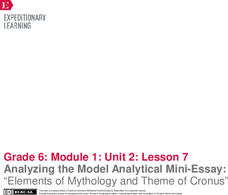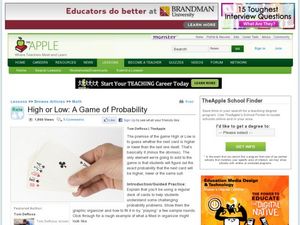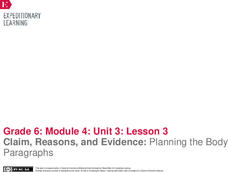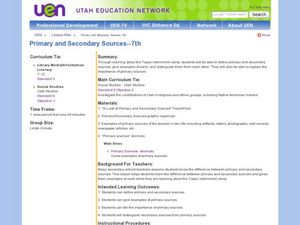Chicago Botanic Garden
Causes and Effects of Climate Change
It's time for your class to literally show what they know! Pupils illustrate what they learned about the causes and effects of climate change by filling out a graphic organizer to complete the 5-part series of lessons. They discuss them...
Curated OER
Graphic Organizer: Research Note Taking Made Easy
What do you wonder about bats? Use an open-ended question like this to engage your class and interest them in an upcoming research project. There's a list of example questions to offer or suggest regarding bats, but see what they can...
Nancy Fetzer's Literacy Connections
Expository Paragraph
Upper elementary and middle school writers learn how to craft an expository paragraph by following the six steps detailed in a 48-page instructional guide. Learners learn how to write six different types of informational paragraphs: to...
Curated OER
A Goldfish is the Best Pet
Provide your class with a list of possible topics (three are included here, but they're not exactly gripping), and polish their persuasive writing skills. This plan really emphasizes the prewriting process, and several graphic organizers...
Ontario
Reading Graphic Text
Do students really need to be taught how to read cartoons, comic books, and comic strips? Yes. Just as they need to learn how to read other forms of graphic text such as diagrams, photos, timetables, maps, charts, and tables. Young...
Curated OER
Sample Lesson 1: Is This Source Credible? Useful? Why and Why Not?
Build background knowledge for The Book Thief by Markus Zusak while teaching your pupils how to determine the credibility of online sources. The plan is designed to take place over the course of two days. On the first day, model how to...
Curated OER
Shizuko's Daughter: Concept of Definition Word Map
Help your class use critical thinking when it comes to unfamiliar words. With vocabulary from Kyoko Mori's Shizuko's Daughter, kids write the word in the center of a graphic organizer, and find its category, comparisons, examples, and...
State University of New York
Going Back in Time Using “George Washington’s Socks”
After reading Elvira Woodruff's George Washington's Socks, young readers and writers embark upon writing their own historically based story, with a focus on developing ideas and details throughout the piece. In small groups, class...
EngageNY
Analyzing the Model Analytical Mini-Essay: “Elements of Mythology and Theme of Cronus”
It's time to make a claim. Scholars learn what it means to make a claim by first looking at a model analytical mini-essay to determine how the author relayed ideas. Pupils then work with partners to discuss how the author might have...
Curated OER
High or Low- Probability
Students use playing cards to examine probability. In this probability lesson, students work in groups with a deck of cards and predict if the next card they lay down will be high or low. Students fill out a graphic organizer with their...
EngageNY
Claim, Reasons, and Evidence: Planning the Body Paragraphs
Planning is the key to success. Scholars continue planning their essays by adding reasons to their Planning My Argument graphic organizers. Additionally, pupils analyze a body paragraph from a model position paper, identifying the...
Curated OER
Differentiated Language Arts
Pupils read speeches and identify the main idea as well as the literary techniques employed, paying careful attention to the persuasion and repetition elements that each speech possesses. Using a graphic organizer, they analyze,...
EngageNY
Choosing a Position: Screen Time and Adolescents
Time to pick a side! Building on the Fishbowl activity from the previous instructional activity, scholars choose a position about whether the American Academy of Pediatrics should raise its screen time recommendations. Using notes,...
ReadWriteThink
Captioning the Civil Rights Movement: Reading the Images, Writing the Words
Scholars boost their knowledge of the Civil Rights Movement with a lesson plan that challenges writers, readers, and historians to analyze primary sources and caption their observations. By way of reading, writing, discussion,...
iCivics
No Rambling Allowed
What makes for a strong persuasive argument? Organization! After deconstructing a sample argument and then following the guidelines of an included worksheet, your class members will learn how evidence can be organized in order to produce...
EngageNY
End of Unit 2 Assessment, Part 1: Drafting The Argument Essay
Scholars write the draft of their essays about Atticus's decision to defend Tom Robinson in Harper Lee's novel To Kill a Mockingbird. They support their claims with reasons, details, and quotes from the novel.
Curated OER
Primary and Secondary Sources - 7th
A link to a beautiful Animoto presentation is included, giving examples of primary sources that a student might want to contact when doing research. Using the Topaz Internment Camp in Utah as a sample topic, middle schoolers view a slide...
Curated OER
Lights Out on Broadway
How do you write arguments that articulate the views of opposing sides? Through concentrated research, investigation, and critical analysis, leaners become more knowledgable on the opposing argument. The class fills in a KWL graphic...
Curated OER
Genre Lesson: Autobiography
Start kids thinking about point of view and autobiographies by telling them a short story about your morning (first person), and then asking a volunteer to re-tell the story to you (second person). There are tips to help you tie this...
Virginia Department of Education
The Writing Process for Persuasive Writing
Get your junior high writers stimulated with the strategies and ideas available in this activity. Learners discuss and debate controversial subjects, and outline their reasons with an online graphic organizer (link included) that creates...
Curated OER
Spinning My Tale
Begin writing personal narratives in this writing lesson. Junior high writers start by writing a journal about their favorite holiday. They read a book at their skill level and use graphic organizers to record their ideas for writing....
Google
Beginner 4: Searching for Evidence for Research Tasks
Having a strong searching skill set can make a research project much easier and much for successful for pupils. Tackle finding evidence with the ideas included here. The ultimate goal is for class members to learn the stepping stones...
EngageNY
Read Expressions in Which Letters Stand for Numbers
Pencil in the resource on writing verbal phrases into your lesson plans. The 15th installment of a 36-part module has scholars write verbal phases for algebraic expressions. They complete a set of problems to solidify this skill.
Civil War
Civil War Medicine: Fact or Fiction
Young historians compare the presentation of medical care during the Civil War in passages from fictional and nonfictional texts. They examine passages from Gone with the Wind by Margaret Mitchell and Soldier's Heart by Gary Paulsen, and...

























